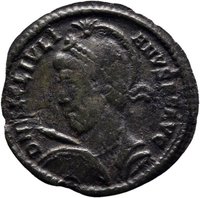
"Julian, rarely Julian II[a] (Latin: Flavius Claudius Julianus Augustus, Greek: Φλάβιος Κλαύδιος Ἰουλιανὸς Αὔγουστος; 331/332 – 26 June 363), was Roman Emperor from 361 to 363, as well as a notable philosopher and author in Greek. His rejection of Christianity, and his promotion of Neoplatonic Hellenism in its place, caused him to be remembered as Julian the Apostate by the Christian church.
A member of the Constantinian dynasty, Julian was orphaned as a child. He was raised by the Gothic slave Mardonius, who had a profound influence on him, providing Julian with an excellent education. Julian became caesar over the western provinces by order of Constantius II in 355, and in this role he campaigned successfully against the Alamanni and Franks. Most notable was his crushing victory over the Alamanni at the Battle of Argentoratum (Strasbourg) in 357, leading his 13,000 men against a Germanic army three times larger. In 360, Julian was proclaimed Augustus by his soldiers at Lutetia (Paris), sparking a civil war with Constantius. However, Constantius died before the two could face each other in battle, and named Julian as his successor." - (en.wikipedia.org 03.05.2020)





